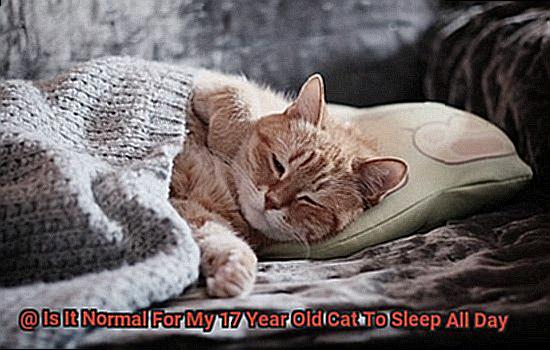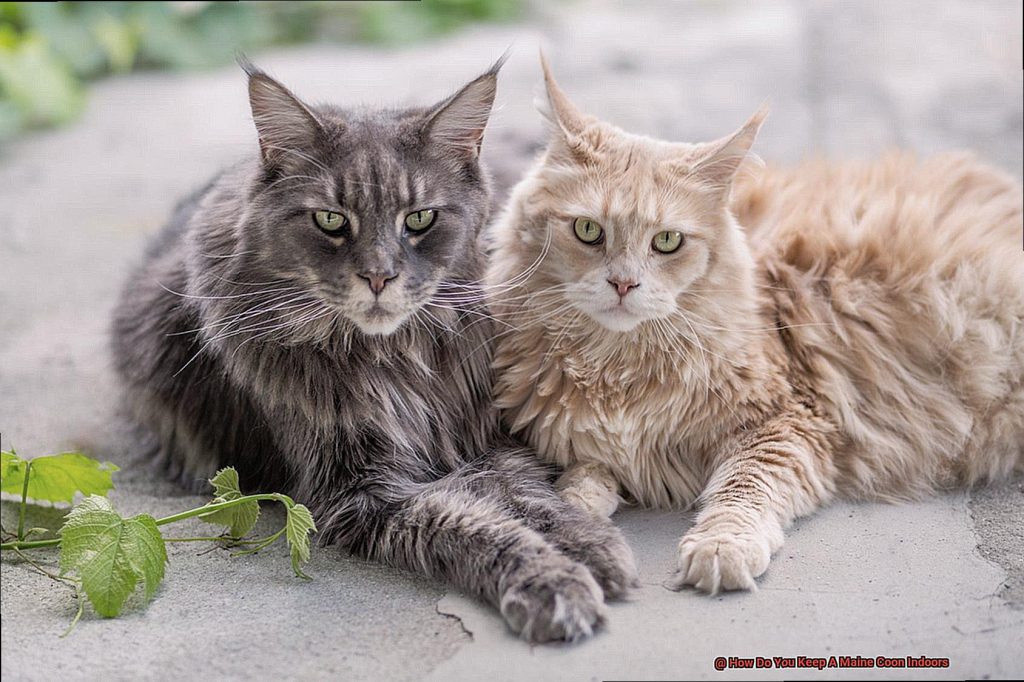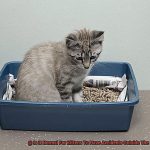We all know that cats have mastered the art of napping, but what about when your 17-year-old feline starts snoozing all day?
As a devoted cat parent and experienced veterinarian, I’ve seen my fair share of senior cats and their sleeping habits. So let’s tackle the question at hand: is it normal for a 17-year-old cat to spend most of their days in dreamland?
Let’s dig into this topic and find out if your furry friend’s slumber is something to worry about or just part of their natural aging process.
Is It Normal For My 17 Year Old Cat To Sleep All Day?
Contents
As cat owners, we all know that our feline friends love to sleep. In fact, cats can sleep for an average of 15 hours a day, regardless of their age. But what about older cats, specifically 17-year-olds? Is it normal for them to sleep even more? As an expert on feline behavior, I’m here to shed some light on this common question and provide insights into when changes in your senior cat’s sleeping patterns may indicate underlying health issues or stress.
Why do cats sleep so much?
First, let’s understand why cats love to sleep. As natural predators, cats’ bodies are designed to conserve energy for hunting and stalking prey. Even domesticated cats still have these instincts ingrained in them, which is why they spend most of their time napping. Additionally, cats are crepuscular animals, meaning they are most active during dawn and dusk. This is why you may notice your cat being more active at these times and sleeping more during the day.
Normal sleeping patterns for 17-year-old cats
As cats age, they tend to sleep even more due to a decrease in their activity levels and metabolism. This is especially true for senior cats like 17-year-olds who may have health issues or mobility problems. So if your older cat is sleeping all day, don’t worry, it’s completely normal.
However, if you notice a sudden change in your cat’s sleeping patterns, it could be a cause for concern.
When should you be concerned?
While it is normal for older cats to sleep more, any sudden changes in their sleeping habits should be monitored closely. Here are some signs that may indicate an underlying health issue or stress:
- Excessive sleeping: If your 17-year-old cat is suddenly sleeping even more than usual, it could be a sign of an underlying health issue.
- Difficulty moving: Arthritis is a common condition in older cats and can make it difficult for them to move around. This can also cause them to sleep more as they are in pain and discomfort.
- Lethargy: If your cat seems unusually lethargic and uninterested in their usual activities, it could be a sign of an underlying health issue or stress.
- Changes in appetite: A decrease in appetite could indicate dental issues or gastrointestinal problems, both of which can affect a cat’s sleeping patterns.
Normal Sleeping Patterns for Cats
As cat owners, we all know that our feline friends love their sleep. In fact, it is not uncommon for cats to sleep for 12-16 hours a day. But what about senior cats? Is it normal for them to sleep all day? As an expert on normal sleeping patterns for cats, I am here to shed some light on this topic and help you understand the various factors that can impact your senior cat’s sleeping habits.
Let’s start with the basics – why do cats sleep so much? Cats are natural hunters and their bodies are built for short bursts of energy rather than sustained activity. This means that they need plenty of rest and sleep to conserve their energy for hunting and playing. So, it is perfectly normal for cats to sleep for extended periods throughout the day.
Now, let’s dive into the factors that can affect a cat’s sleeping patterns, specifically in senior cats. As cats age, they tend to become less active and require more rest and sleep. This is especially true for senior cats who are 17 years or older. Their bodies are not as agile and energetic as they used to be, so they naturally sleep more.
Furthermore, a cat’s health can also play a role in their sleeping habits. Cats who are sick or in pain may sleep more as their bodies try to heal and recover. On the other hand, cats who are not feeling well may have trouble sleeping or may sleep more restlessly. It is important to monitor your cat’s sleeping patterns and consult a veterinarian if you notice any significant changes.
The environment in which a cat lives can also impact their sleeping habits. Indoor cats tend to sleep more than outdoor cats due to the lack of stimulation and physical activity in their surroundings. Additionally, cats who live in multi-cat households may have different sleeping patterns as they adjust to the dynamics and hierarchy within the group.
Changes in Sleeping Habits as Cats Age
Just like us, cats go through physical and behavioral changes as they grow older. In this post, we will discuss how cats’ sleeping habits change as they age and what external factors can influence these changes.
Normal Aging Process
Just like humans, cats experience a natural decline in their energy levels and physical abilities as they age. It is normal for senior cats, around the age of 17, to sleep more than they did when they were younger. This can be attributed to the fact that their bodies are not as agile and they require more rest to recharge and conserve energy.
Decreased Activity Levels
As cats age, they become less active and may prefer to spend more time resting or sleeping. This is a result of their decreased energy levels and ability to engage in physical activities. However, it is important to note that any sudden or drastic changes in your cat’s sleeping patterns could also be a sign of an underlying health issue and should be addressed by a veterinarian.
Changes in Sleep-Wake Cycle
Senior cats may also experience changes in their sleep-wake cycle, resulting in them being more active at night and sleeping during the day. This is due to their natural instinct as nocturnal animals. To manage this, provide a comfortable and safe environment for your cat to sleep during the day, such as a cozy bed in a quiet room.
External Factors
Apart from natural aging processes, external factors can also influence changes in your cat’s sleeping habits. Changes in routine, environment, or the addition of new pets to the household can disrupt your cat’s sleep patterns. It is important for cat owners to monitor their cat’s sleeping habits and make necessary adjustments to ensure their comfort and well-being.
Health Issues That May Affect a Cat’s Sleeping Patterns
As a cat owner, it’s not uncommon to see your furry friend snoozing away for most of the day. In fact, it’s perfectly normal for cats to sleep for up to 20 hours a day, especially as they age. But what if you start noticing that your cat is sleeping even more than usual? Or perhaps they seem restless and unable to get quality rest? These changes in sleeping patterns could be signs of underlying health issues that need to be addressed.
Let’s take a closer look at some of the factors that can impact a cat’s sleeping patterns and what they could mean for your feline friend’s health.
Older Cats Tend to Sleep More
It’s no secret that as cats age, they become less active and their bodies slow down. This is why it’s common for senior cats, like a 17-year-old, to sleep more than their younger counterparts. So, if you have an older cat who seems to be napping more than usual, it’s likely just a natural part of their aging process.
However, it’s important to note that excessive sleeping in older cats could also be a sign of an underlying health issue. It’s always best to keep an eye on any changes in your cat’s sleeping patterns and consult with a veterinarian if you have any concerns.
Underlying Health Conditions
While it may be normal for older cats to sleep more, excessive sleeping could also be a red flag for underlying health conditions. Some common health problems that can affect a cat’s sleeping patterns include arthritis, kidney disease, and hyperthyroidism.
If you notice that your cat is sleeping more than usual and showing other symptoms such as weight loss, changes in appetite, or lethargy, it’s important to consult with a veterinarian for proper diagnosis and treatment.
Pain or Discomfort
Just like humans, cats may retreat to sleep as a way to cope with pain or discomfort. This could be caused by various factors such as dental issues, joint pain, or gastrointestinal problems. If you notice your cat sleeping more than usual and showing signs of discomfort when awake, it’s important to seek advice from a veterinarian.
Environmental Factors and Their Impact on a Cat’s Sleep

Cats are known for their love of sleep, with the average cat sleeping anywhere from 12-16 hours a day. However, as they age, their sleep patterns can change due to various factors, including environmental factors. As an expert on the topic of feline sleep, I have seen firsthand how changes in noise levels and household dynamics can affect a cat’s rest. In this blog post, I will delve deeper into this topic and provide useful insights for cat owners on how to ensure their furry companions get the quality sleep they need.
Understanding a Cat’s Natural Sleep Patterns
Before we dive into how environmental factors can impact a cat’s sleep, it’s essential to understand their natural sleep patterns. Cats are crepuscular animals, which means they are most active during dawn and dusk. This is due to their ancestral instincts as hunters that would be most active during low light conditions to catch their prey. As such, cats tend to sleep during the day and be more active at night.
However, as cats age, their sleep patterns can change due to various factors. Let’s explore how environmental factors can play a role in this.
Noise Levels and Household Dynamics
One significant factor that can affect a cat’s sleep is noise levels and household dynamics. Cats are sensitive creatures, and loud noises or disruptions in their daily routine can cause stress and anxiety. This can lead to increased daytime sleeping as a coping mechanism. If you notice your cat sleeping more during the day than usual, it could be a sign that something in their environment is causing them discomfort.
Changes in the Household
Just like humans, cats can also experience stress when there are changes in their environment. Moving to a new home or introducing a new pet or family member can disrupt a cat’s daily routine and cause them to feel anxious. This anxiety can lead to changes in their sleep patterns, such as sleeping more during the day. It’s essential to give your cat time to adjust to any changes and provide them with a quiet and comfortable space to rest.
Breed Differences in Sleeping Habits
As cat owners, we all know that our feline friends love to sleep. In fact, the average cat sleeps anywhere from 12-16 hours a day. But have you ever noticed that some breeds seem to sleep more than others? Or maybe your own cat’s sleeping habits have changed over time? Understanding the differences in sleeping patterns among cat breeds can help us determine if our cat’s excessive sleeping is normal or if it could be a sign of a potential health issue.
Breed Genetics and Personality
Just like humans, different cat breeds have varying genetics and personalities that can influence their sleeping habits. For example, breeds such as the Siamese and Abyssinian are known for their high energy levels and love of play, which may result in them needing less sleep compared to other breeds. On the other hand, breeds like the Persian and Ragdoll are known for their laid-back and calm personalities, making them more inclined to nap for longer periods of time.
Health Factors
Aside from breed genetics and personality, a cat’s overall health can also play a role in their sleeping habits. Senior cats or those with health issues may require more rest and sleep compared to younger and healthier cats. It is important for cat owners to be aware of their cat’s age and any potential health concerns when monitoring their sleeping habits.
Individual Needs
It’s also important to remember that every cat is unique and may have different individual needs when it comes to sleep. Some cats may simply require more rest and downtime than others, regardless of their breed. It’s important for cat owners to observe their cat’s behavior and consult with a veterinarian if they have any concerns about their sleeping habits.
Breed-Specific Sleeping Habits
Some breeds have been specifically bred for certain traits, including energy levels and activity levels. For example, Maine Coons and Norwegian Forest Cats are known for being active hunters and may have higher energy levels compared to other breeds. As a result, these cats may need more playtime and stimulation throughout the day, leading to less time spent sleeping.
Cognitive Decline and Its Effect on a Cat’s Sleep
Just like humans, cats can experience cognitive decline as they age. This can have a significant impact on their sleep patterns, behavior, and daily routines. As an expert on the topic of cognitive decline and its effect on a cat’s sleep, let’s dive into this topic and explore how it can affect our furry friends.
Changes in sleep patterns
It is normal for older cats to sleep more than younger cats. However, excessive sleeping can be a sign of cognitive decline. Cats with cognitive decline may have trouble remembering routines or recognizing familiar objects, leading them to sleep more as a way to cope with confusion and disorientation. This can also lead to changes in their sleep-wake cycle, causing them to sleep during the day and be more active at night. So if you’re being kept up by your senior cat’s late-night zoomies, it may be a sign of cognitive decline.
Unusual sleeping spots
Have you noticed your older cat sleeping in unusual places, such as on the kitchen counter or in the bathroom? This could be another indication of cognitive decline. As their memory declines, they may forget where their usual sleeping spots are and seek out new ones. This behavior can also stem from their need for a safe and quiet place to rest and escape from any potential confusion or disorientation.
Other signs of cognitive decline
Changes in sleep patterns and unusual sleeping spots are not the only indicators of cognitive decline in cats. Owners may also notice increased vocalization, decreased grooming, and changes in appetite. If you notice any of these signs, it is important to consult with your veterinarian for proper diagnosis and management.
Managing cognitive decline
Fortunately, there are medications and supplements available that can help improve cognitive function in cats and alleviate some of the symptoms of cognitive decline. Your veterinarian can prescribe these options and monitor your cat’s progress. Additionally, providing a stimulating environment with toys and puzzles can help keep an older cat’s mind active and delay the onset of cognitive decline.
Conclusion
In summary, as devoted cat parents and experienced veterinarians, we understand the concern that may arise when our 17-year-old feline starts sleeping all day. However, after delving into this topic, we can confidently say that it is completely normal for senior cats to sleep more as they age. This is due to a combination of factors such as their natural instincts, decreased activity levels, and potential health concerns.
But don’t let your worries consume you – remember that every cat is unique and may have different individual needs when it comes to sleep. While some may require more rest due to age-related changes in their bodies, others may still be spry and active despite their advanced years.
It’s also important to consider external factors that may affect your cat’s sleep patterns. Changes in the household or loud noises can disrupt their peaceful slumber, so it’s essential to provide a quiet and comfortable environment for them to rest.
As responsible pet owners, it is our duty to provide a safe and nurturing environment for our furry friends, especially in their golden years. Keep an eye out for any changes in their sleeping habits and consult with your veterinarian if necessary.
So, let’s embrace our senior cats’ love for napping and continue to cherish every moment with them. After all, age is just a number and our love for them will never waver.






